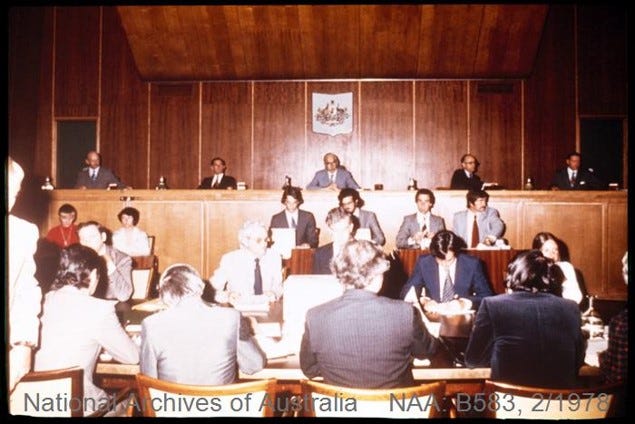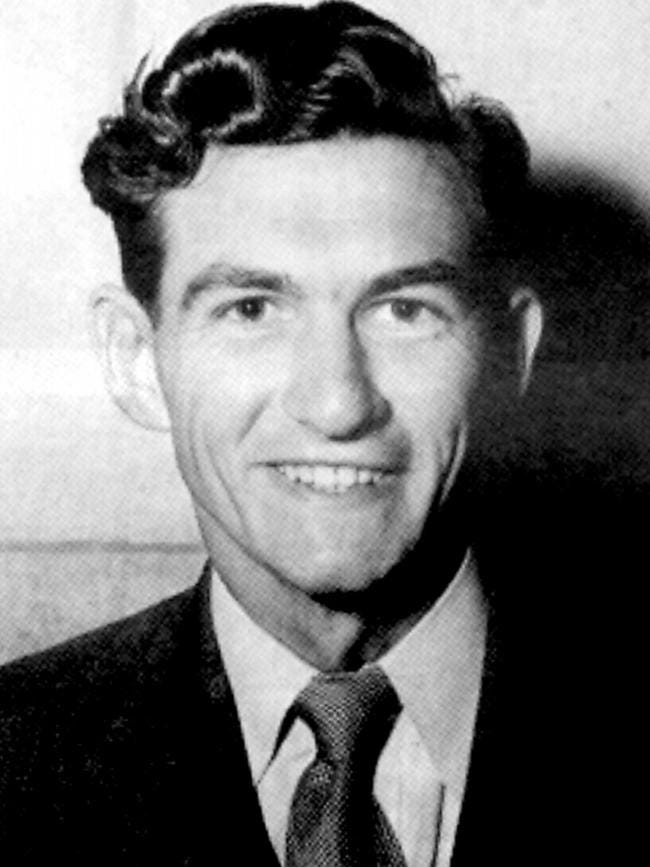In 1958, ACTU Secretary Harold Souter believed that his new hire would last for a couple of years before he would be replaced by ‘someone else from the universities.’
That new employee was Bob Hawke, and he would be at the ACTU for the next 22 years – a period in which he would arguably have greater influence than any other individual over the practice of industrial relations in this country.
22 years that set him on the path to the prime ministership.
This article is one of a series on Hawke’s contribution to industrial relations. I tell this story more fully in my forthcoming book: No Power Greater: A History of Union Action in Australia (forthcoming in May). You can preorder your copy here: https://www.mup.com.au/books/no-power-greater-paperback-softback
In my previous post I explored Hawke’s academic career as a scholar of arbitration and the basic wage. Hawke was particularly incensed at a decision of the Arbitration Court in 1953 to end its practice of automatic wage indexation
This meant an automatic adjustment of wages to offset the effects of rising prices (inflation).
Hawke considered the ending of automatic adjustment to be fundamentally unjust towards workers. He also believed the Court was exceeding its purpose as an industrial tribunal, and had become a conductor of economic affairs.
This decision was strongly associated with the President of the Court, William Kelly. Kelly was a figure of great controversy due to his staunch and deeply held conservative beliefs. He advocated the moral and social value of a reinvigoration of peasant-based lifestyles, and dreamed of a return of the Australian population to a more bucolic form of living. Seriously.
After 1953, instead of regular and automatic increases, the basic wage (which we discussed last time – effectively a form of minimum wage that determined at least part of most workers’ wage rates) would rise only when the Court had met and decided an increase was appropriate after lengthy consideration of whether the economy could afford an increase (this was known as the ‘capacity to pay’).
To attain an increase in the basic wage, the union movement had to demonstrate that economic indicators showed a rise was affordable. This placed great strains on the movement to build up its economic credentials, and to frame its arguments for increases with detailed and complex economic analysis based on the latest data and trends.
Against them, stood the employer organisations, determined to insist at every opportunity that the economy did not have the capacity to pay for wage increases.
It was a tense and difficult situation. In 1956, an appeal by the Boilermakers Society against fines imposed by the Arbitration Court led to a High Court ruling that the tribunal did not have the constitutional power to impose such penalties. As a result of this ruling, a new Industrial Court was formed for enforcement, and the Arbitration Court became the Arbitration Commission.
In 1956, the ACTU hosted a special Congress to deal with the consequences of all these changes in the arbitration system.
Bob Hawke, recently returned from his studies at Oxford and working at the Australian National University, asked if he could attend to share his expertise. The ACTU agreed. Connections Hawke made at the conference were pivotal to his appointment as the ACTU’s Advocate and Research Officer in 1958.
The life of the ACTU Advocate was far from glamorous. Hawke worked punishingly long hours in his new role. The ACTU was based in a small two-storey ‘red brick box’ building, directly across from the Trades Hall Building in Melbourne, close to the Lygon Hotel (now the John Curtin Hotel), that Hawke frequented too often.
Hawke worked in a pokey little office in the top floor of the building, up the rickety stairs, where the temperatures during summer would reach close to 50 degrees Celsius.
Hawke recalled the pressurised working environment when preparing and arguing a case before the Commission:
‘I’d leave home at four or four-thirty in the morning and work for five hours before going into court. I taught myself to lie on the floor and sleep during the lunch adjournment, then could return fresh to court. I’d have a nap in the late afternoon, and work into the night. The pressure was unbelievable. In the peak periods it was seven days a week, eighteen hours a day, for several weeks.’
Hawke made his case with great passion. Sometimes too much, as he could slip into an overly polemical and phlegmatic mode that alienated rather than persuaded the bench to whom he was making his case.
He spoke with extraordinary speed, at such a pace that all but the best shorthand writers had trouble keeping up with him. He was loud! It was often joked that union officials several blocks away in the Trades Hall building could hear him delivering his sermons at the Commission.
And he was devastating.
One of my favourite stories about Hawke at this time was from his first case, the 1959 wage case.
At the hearing, Hawke called into question the evidence that had been provided for the employers by RP Truman, an accountant and company director whose testimony had been used against unions previously on five separate occasions. Hawke explained that he intended to demonstrate the fallaciousness of this evidence, to which the President of the Commission stated ‘Mr Truman … can always very ruggedly defend himself.’
Hawke replied: ‘We’ll see about that.’
Hawke challenged Truman’s use of the Commonwealth Bank’s measurement of company profits in his evidence. Hawke later recounted:
‘When pressed in cross-examination he maintained that a certain officer in the research section of the Bank had given him this information. When contacted, the officer denied this, acknowledging the method used by the Bank was as stated by us [the ACTU]. We proposed calling the officer to give evidence and in the event Truman and the employers abandoned the position originally adopted, admitting to the Commission that the position was as stated by us.’
Truman’s testimony was never used at the Commission again.

In addition to disproving his opponents, Hawke made the positive argument that workers had a right to receive wages that enabled them to have a decent standard of living.
Hawke’s first case was a success – though he did not realise his ambition of destroying the 1953 decision.
The Commission accepted that the vagaries of the application of ‘capacity to pay’ had allowed real wages to stagnate. It ruled in favour of a substantial increase in the basic wage that raised it above the level it would have been had automatic indexation been applied since 1953.
In the years that followed, Hawke used his appearances at the Commission to build a consistent case that the tribunal’s primary responsibility was to set a just wage, which could not be said to have been done if real wages were declining against rising costs at the same time that productivity was improving and the economy was growing.
Workers were, Hawke argued, trapped in a snare: real wages would decline if they were only adjusted for productivity while prices were increasing – wages needed to be adjusted for both productivity and price increases.
He later summarised what he understood to be at stake:
‘Between 1953 and 1961 you had this situation where the tribunal attempted to make decisions which were calculated not to rock the boat. On every occasion the employers came along, assisted by the Commonwealth Government, and said, “there is some particular reason why, regretfully” – regretfully, of course; regretfully always – “we cannot give you the increase which is necessary to enable you to have the same standard in your wage that has existed previously in real purchasing power.’
Hawke was ultimately successful in winning wage rises for workers, and even in getting the logic of the 1953 decision overturned.
Through his advocacy, Hawke had been successful in shifting the Commission’s emphasis from predominantly considering industry’s ‘capacity to pay’ to also re-incorporating focus on ensuring wages allowed working people to earn enough to live on.
He was deeply concerned, however, from the mid-1960s when the Commission adopted a new means of setting wages that departed from past practice and set what was known as the ‘total wage’ – a whole other saga. If you want to know more, I strongly recommend D’Alpuget’s biography, and also the fantastic collection of essays on the history of arbitration edited by Joe Isaac and Stuart Macintyre, A New Province for Law and Order.
Developments in these years convinced Hawke that it was not enough to Advocate to the Commission. He had to be in a position to influence the way that wage setting was determined in this country.
This realisation set him on course with the next major step in his career: his candidacy for the ACTU Presidency.
We will look at this in the next instalment in this miniseries.






